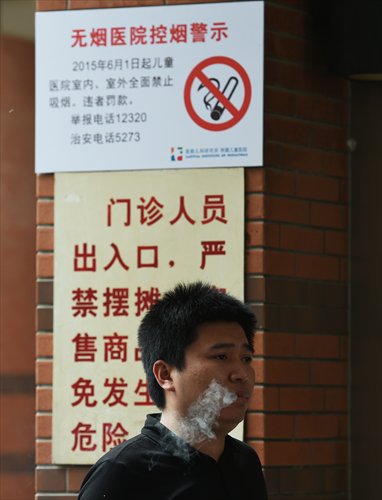Beijing begins public smoking ban
Rule may eventually be spread to the rest of China: expert

A man smokes a cigarette near a new no-smoking sign at the entrance to a children's hospital in Beijing on Monday. The toughest anti-smoking legislation in China's history came into effect on June 1 in Beijing, with unprecedented fines and a hotline to report offenders. Photo: AFP
Smoking in indoor public places has been banned in Beijing from Monday following the rolling out of new rules dubbed the "strongest ever smoking ban" in China, triggering public concern over how the ban will be enforced in the long term.
Over 1,000 employees from the Beijing Health Inspection Institute on Monday launched inspection tours around major public facilities including government buildings, medical institutions, schools, restaurants and entertainment venues.
A branch of the Sichuan hotpot chain restaurant Haidilao received the first rectification notice as the no-smoking signs in the restaurant were not in line with requirements. Two cigarette butts were also discovered in its men's room.
Wang Benjin, a deputy director with the institute, told the Global Times Monday that such intensive inspections will last three days and after this inspections will continue in a three-month-long campaign to punish violators.
Wang said that law enforcement officers cannot monitor all public venues all the time and that they will turn the inspections into a regular routine.
All the smoking rooms in Beijing Capital International Airport were required to shut down on Monday.
From Beijing to the nation
Previous anti-smoking regulations were rarely obeyed by smokers, as enforcement of the rules was rare.
"Most people didn't realize how harmful secondhand smoking is. The rule aims to raise public awareness and curb smoking by combining government efforts, venue owners' management, personal discipline and social supervision together," Wu Yiqun, deputy director of ThinkTank Research Center for Health Development, a Beijing-based NGO, told the Global Times.
Wu said that this ban differs from previous efforts to stamp out public smoking as it includes tough punishments for venue owners, which will urge them to dissuade people from smoking.
Ensuring that this ban is enforced in the long term depends on different government departments cooperating and the involvement of the public. While those responsible for enforcing the ban should tighten their management, the public should also report violations via a supervision hotline, said Wu.
According to The Mirror newspaper, the hotline received 39 calls on Monday morning. A survey conducted by the Beijing Patriotic Health Campaign Committee; the Association on Tobacco Control, an NGO; and 163.com, a news portal; showed that over 60 percent of 100,000 respondents said that they will take action against smokers that flout the ban.
Zhang Jianshu, president of the association, said that such a campaign should be spread across China and that the authorities are drafting national regulations.
"Curbing smoking doesn't aim to deprive people of their right to smoke, but to free people from being hurt by secondhand smoking," said Zhang.
According to the new rules, smoking is banned in all indoor public places including restaurants, office buildings and on public transport.
The ban also extends to some open-air spaces such as the grounds of schools, women's and children's hospitals, sports venues and cultural relic protection sites.
Individual violators will be fined up to 200 yuan ($32), while a maximum penalty of 10,000 yuan will be imposed on the owners of venues who fail to put up no-smoking signs or who allow smoking in their premises.
Health authorities have said that China currently has more than 300 million smokers and more than 1.4 million people in the country die of tobacco-related diseases every year. Beijing has 4.19 million smokers, accounting for 23 percent of the city's total population.
Changing times
However, Wu said that tobacco enterprises might pose an obstacle for those seeking a nationwide ban, suggesting a larger hike on tobacco consumption taxes and that cigarette prices should be adjusted.
Zhang said the anti-smoking campaign will be a long-term task, but it may have a promising future.
According to Zhang, smoking used to be regarded as a symbol of power. Chinese officials and former leaders were often seen smoking in photos or on TV.
"Times have changed. The anti-smoking campaign involves not only the public but also the government," he said, adding that President Xi Jinping's wife, Peng Liyuan, is a vocal anti-smoking campaigner and that Xi is never seen in public with a cigarette between his fingers.
Since 2009, Peng has served as an ambassador for tobacco control for the Chinese Association on Tobacco Control.
In 2013, the Chinese government iss ued a notice, requesting government officials not to smoke in public places and asking local governments to carry out detailed plans to supervise the behavior of officials.